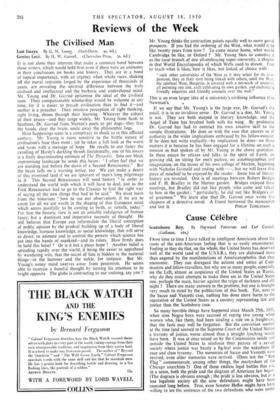Reviews of the Week
The Civilised Man
IT is not alone their interests that make a common bond between these writers, which would hold firm even if there were an antinomy in their conclusions on books and history. They are in a bond of topical importance, with an urgency when whole races, shaking off the moral restraints forged by the experience of thousands of years, are revealing the spiritual difference between the truly civilised and intellectual and the barbaric and undeveloped mind. Mr. Young and Dr. Garrod epitomise the ideal of the civilised man. Their companionable scholarship would be welcome at any time, for it is easier to preach civilisation than to find it—and neither is a preacher. Their intuitive perception of right thinking, right living, shines through their learning. Whatever the subject of their essays—and they range widely, Mr. Young from Scott to heathens, Dr. Garrod from Merton's poets to pet dogs—they free the hands, clear the brain, smile away the philosophic fogs.
Most happenings seem in a conspiracy to shock us in this afflicted century. Mr. Young is more sensitive to the brittle nature of civilisation's base than most ; yet he takes a full look at the worst and turns with a message of hope He recalls to our fancy the carolling of Hardy's darkling thrush (incidentally, one of his essays is a finely discriminating estimate of The Dynasts). Into our bleak unpromising landscape he sends this beam: " I often feel that we are standing just before the dawn of a Second Renaissance." But the beam falls on a warning notice, too. We can make a desert of this promised land if we are ignorant of man's long pilgrimage to it. This Second Renaissance will need history " in order to understand the world with which it will have to deal, just as the First Renaissance had to go to the Classics to find the right way of saying all the new things that had to be said." We must learn from the historians " how to use our observations if we are to count for' all we are worth in the shaping of that European mind which seems painfully to be coming to birth, or rebirth, today." For him the historic view is not an amiable indulgence of human fancy, but a dominant and imperative necessity of thought. He still believes that Europe can reformulate the liberal conception of public opinion by the gradual building up of a body of liberal knowledge, humane knowledge, or social knowledge, that will serve to direct, to animate and to control the powers which science has put into the hands of mankind—and its rulers. How firmly does he hold this belief ? Or is it but a pious hope ? Another belief is spreading rapidly over the world, it being the easier to apprehend by wandering wits, that the secret of fate is hidden in the material things—in the hammer and the sickle, for instance. But Mr. Young's sunny mind swerves away from pessimism. He seems able to exorcise a baneful thought by turning his attention to its bright opposite. The globe is contracting to our undoing, say you ? Mr. Young thinks the contraction points equally well to more genial prospects. If you had the ordering of the West, what would it be like twenty years from now ? To come nearer home, what would Cambridge be like, or Oxford ? Mr. Young likes to conceive it as the local branch of one all-embracing super-university, a chapter in that World Encyclopaedia of which Wells used to dream. Free to teach what it likes, how it likes, but linked of choice with
" such other universities of the West as it may select for its com- panions, they in their turn being linked with others, until the Weit, the spiritual West, Hesperia, is covered with a net-work of societizs, all pursuing one aim, each cultivating its own garden, and exchangi,g friendly enquiries and friendly counsels over the wall."
This is an even larger idea of a university's civilising influence than Newman's. •
If we say that Mr. Young's is the large eye, Dr. Garrod's the small, it is in no invidious sense. Dr. Garrod is a don, Mr. Young is not. They are both steeped in literary knowledge, and the Angel of Taste has brushed both with his wing. By profession Dr. Garrod has had to contract his own creative skill to the sample illustrations. He does so with the ease that assures us of authority in the wider implications embraced by his fellow-essayist. If he does not write explicitly—by implication he does—on those matters it is because he has been engaged for a lifetime on. such a mission as that spoken of by Mr. Young in the above quotation. In these essays he relaxes and talks, in the spirit of Lamb, on growing old, on sitting for one's picture, on autobiographies and imagination, on the muses of his own college of Merton, beginning with Nicholas Grimald and ending with—, but we will leave that piece of mischief to be enjoyed by the reader. Some bits of literary history are revealed. One is of meetings between Robert Bridges and F. H. Bradley in the Merton garden. Bridges enjoyed these meetings, but Bradley did not like people who came and talked to him in the garden ; " particularly, he did not like Bridges's air of greatness." We learn also that Dr. Garrod once wrote five chapters of a detective novel. A friend borrowed the manuscript


































 Previous page
Previous page